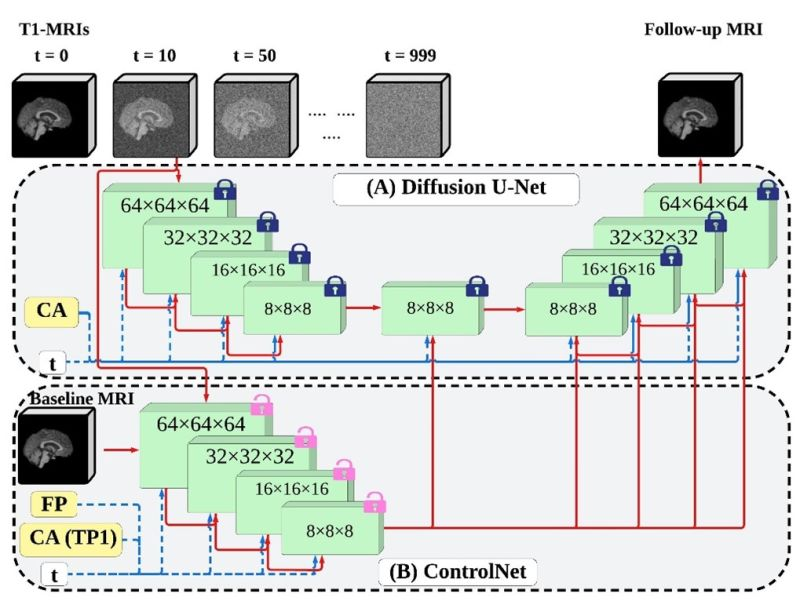What if a single MRI scan could reveal your risk for Alzheimer’s disease long before any symptoms emerge? As neurodegenerative conditions rise worldwide, innovative solutions are more critical than ever. Advanced AI breakthroughs are making this future a reality, providing new hope for patients and healthcare providers alike.
Neurodegenerative diseases like Alzheimer's are a growing concern in the U.S., with over 7 million Americans living with Alzheimer's disease today. By 2060, that number is expected to grow, affecting nearly 13 million people.

Diagram of the AI model: Part A (U-Net diffusion model) processes 3D medical images, while part B (ControlNet) uses a person's earlier MRI to guide predictions. Researchers first trained the U-Net model as a baseline model and then trained ControlNet to make predictions based on the baseline images.
Credit: Gengshuo Liu, University of Southern California
Transformative Advances in Brain Imaging
Researchers at the University of Southern California, supported by the National Science Foundation (NSF), have created an AI-powered system capable of predicting how a healthy adult brain may change over time.
The approach uses a combination of 3D diffusion models and a ControlNet framework to analyze current MRI scans and generate highly realistic future images of the brain. These tools allow the AI to simulate brain aging based on just a single baseline scan.
This capability enables clinicians to spot minute changes in brain structure, years before they might be detectable using traditional diagnostic methods. By visualizing how the brain could evolve, medical professionals gain a valuable early warning system for diseases like Alzheimer’s.
Collaboration Across Disciplines
The success of this project is rooted in multidisciplinary teamwork. Experts in fields like electrical and computer engineering, biomedical engineering, neuroscience, and data science contributed their knowledge.
The NSF’s funding, targeting areas such as medical cyber-physical systems and trustworthy AI, was pivotal in supporting the project’s advanced mathematical models. These frameworks ensure that AI-generated images are not only accurate but also clinically meaningful.
Researchers including Gengshuo Liu, Nikhil Chaudhari, Nikos Kanakaris, Chenzhong Yin, and Andrei Irimia brought diverse perspectives to the table, further strengthening the project’s foundations.
Impact on Healthcare and Beyond
The potential impact of this technology is substantial. Early detection can lower healthcare costs, enhance patient outcomes, and give families and caregivers more time to prepare and intervene. Comparative studies have shown that the AI-generated brain scans are nearly indistinguishable from real MRIs, demonstrating the technology’s promise.
- Reduced health care costs: Early interventions mean fewer expensive treatments later.
- Improved quality of life: Patients and families can plan and manage care proactively.
- Wider applications: The AI framework could be adapted to monitor other organs, broadening its use across preventive medicine.
The research team is working to expand their dataset and collaborate with clinical partners, aiming to bring these AI tools into routine medical practice.
Looking Ahead
This breakthrough suggests a future where predictive AI is a cornerstone of preventive medicine. With ongoing research and collaboration, tools like these could help doctors identify neurodegenerative diseases in their earliest stages, potentially delaying or even preventing onset. The result? Improved patient outcomes and a lighter national burden of chronic illness.

Predictive AI Models Could Upend Early Detection of Neurodegenerative Diseases